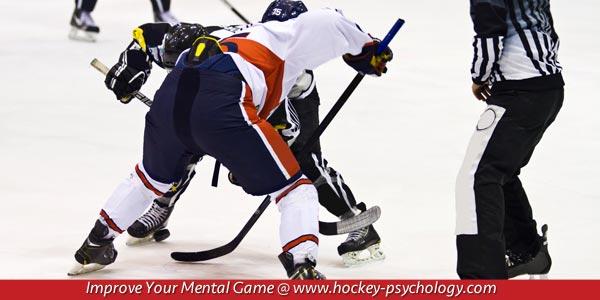Be Mentally Prepared to Perform Your Best Away.
How much has travel negatively affected your play on the ice? Travel is not a fun aspect of playing hockey. Learning how to be mentally prepared can be a game-changer.
Hockey rinks are few and far between. Tournaments are often hours away or even in a different state. Many tournaments are over the course of a couple of days.
When your team is scheduled for a multi-day tournament a distance away, you have to wake up early in the morning and pack all your equipment and extra clothes.
You get into the car and try to get some sleep even though you are cramped in a small space. You arrive at a hotel, check in, and quickly drive to the rink for game time.
You are physically and mentally exhausted. After the game, you get something quick to eat and back to the hotel for the night. You have trouble sleeping, the hotel bed is uncomfortable, and your anxiety rises.
You wonder if you will have the energy to play the next day. You wake up tired from a lack of sleep and head to the rink for the next game.
Preparation is difficult when your routine is dramatically thrown off. Stress is the most difficult aspect.
You need a strong mentality to be ready for the stress of travel and challenging circumstances.
The coronavirus has thrown off the schedule and routines of all the hockey teams in the American Hockey League. Instead of 76 games, the teams are playing a 30-game schedule against divisional opponents. Day-to-day routines, travel, and logistics have been greatly impacted.
Grand Rapids Griffins coach Ben Simon commented on the challenges players will face mentally and physically.
SIMON: “Now, the logistics of planning both mentally and physically is different because we are driving the day of the game. We get up in the morning and leave at 8:30, stop for a snack and coffee and stretch our legs, then get to the rink two hours before the game or whatever the protocols are, play the game, jump on the bus, and head home… That’s a little bit different from the players’ preparation standpoint.”
The More Prepared You Are, the Easier it Will be to Adapt
You can help the process by packing equipment the night before, bringing prepared food and snacks from home, bringing your pillow, and getting to the rink early to acclimate yourself to the arena.
Mentally, you can visualize the whole experience throughout the days before, making the situation less daunting. Also, learning some relaxation drills will help you mitigate anxiety.
When you are physically and mentally prepared for logistical challenges, you minimize distractions and help place all your energy and focus on playing great hockey.
Anticipate Travel Challenges for Hockey Games:
Make a list of the potential challenges you will experience traveling long distances for games or tournaments.
Next, write 1-2 strategies to help you manage those circumstances. Having a plan helps you mentally prepare for potential distractions and conserves your mental and physical energy.
Related Articles on Hockey Mental Game
- Mental Preparation And Moving to Starter
- Preparation And Focus For Confidence in Sports
- How to Create a Winning Mindset for Hockey
*Subscribe to The Sports Psychology Podcast on iTunes
*Subscribe to The Sports Psychology Podcast on Spotify
Mental Coaching Programs for Hockey
Our mental game coaching programs for hockey players helps athletes improve confidence, concentration, let go of errors quickly, and stay composed during crunch-time. Read more about sports psychology for hockey players at Peaksports.com
Please contact me by phone at 888-742-7225 or by filling out the webform below to learn more about our personal mental training programs for hockey players or teams:

Leave a Reply